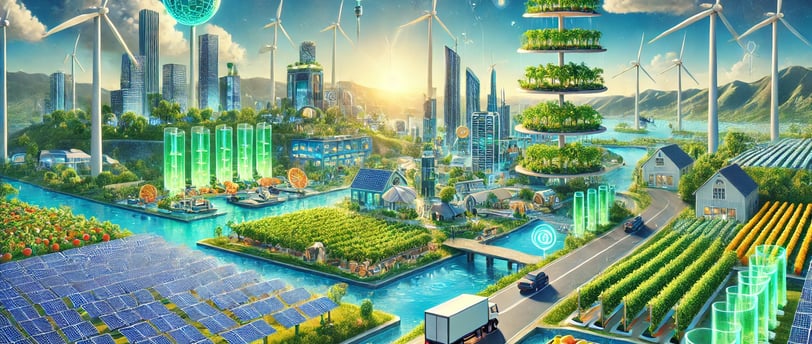Top Green Tech Innovations Leading the Sustainability Movement
GREEN TECHNOLOGY
12/22/20243 min read


As climate change and environmental concerns become more urgent, green technology has emerged as a beacon of hope. These innovations are reshaping industries and daily life, driving the world toward a more sustainable future. Here are some of the top green tech innovations that are making a significant impact on the sustainability movement.
1. Renewable Energy Advancements
The push toward renewable energy has accelerated with groundbreaking innovations in solar, wind, and hydroelectric power. These technologies are becoming more efficient, affordable, and accessible than ever before.
Perovskite Solar Cells: These next-generation solar cells offer higher efficiency at a lower cost, potentially revolutionizing solar energy adoption.
Floating Wind Farms: Offshore wind farms are now being deployed in deeper waters, harnessing stronger winds to generate more power.
2. Energy Storage Solutions
One of the biggest challenges in renewable energy has been storage. Recent advancements in battery technology are addressing this issue, ensuring that surplus energy can be stored for later use.
Solid-State Batteries: Safer and more efficient than traditional lithium-ion batteries, these are set to become the standard in energy storage.
Grid-Scale Energy Storage: Companies are developing massive battery systems to store renewable energy and stabilize power grids.
3. Electric and Hydrogen-Powered Vehicles
The transportation sector is undergoing a green revolution with the rise of electric vehicles (EVs) and hydrogen fuel cell technology.
EV Innovations: Extended-range batteries and ultra-fast charging stations are making electric vehicles more practical for everyday use.
Hydrogen-Powered Trucks: Hydrogen fuel cells are being adopted for heavy-duty vehicles, offering a zero-emission alternative to diesel.
4. Green Building Technologies
Buildings account for a significant portion of global energy use and carbon emissions. Green tech is transforming construction and building management to reduce environmental impact.
Smart Energy Management Systems: IoT-enabled systems optimize energy use in real-time, reducing waste.
Carbon-Negative Materials: Innovations like hempcrete and carbon-absorbing concrete are revolutionizing sustainable construction.
5. Circular Economy Solutions
The concept of a circular economy—where waste is minimized and resources are reused—is gaining traction with green tech innovations.
Plastic Recycling Breakthroughs: Advanced chemical recycling processes can break down plastics into their original components for reuse.
Upcycling Technologies: Companies are turning waste materials into high-value products, such as furniture made from ocean plastics.
6. Precision Agriculture
Agriculture is being transformed by technology that allows farmers to increase yield while reducing resource use.
Drones and Sensors: These technologies provide real-time data on soil health and crop conditions, enabling precise interventions.
Vertical Farming: By growing crops indoors in stacked layers, vertical farming uses less water and land while producing year-round yields.
7. Water Purification and Conservation
Access to clean water is a pressing global issue. Green tech is addressing this with innovative purification and conservation methods.
Desalination Technologies: Energy-efficient desalination systems are making seawater drinkable at lower costs.
Smart Irrigation Systems: IoT-based irrigation systems optimize water use in agriculture, reducing waste.
8. Carbon Capture and Storage (CCS)
To combat climate change, technologies are being developed to capture and store carbon dioxide emissions from industrial processes.
Direct Air Capture (DAC): Machines that pull CO2 directly from the atmosphere are being deployed to offset emissions.
Biochar: This carbon-rich material, created from biomass, can sequester carbon while enriching soil.
9. Waste-to-Energy Systems
Innovative systems are turning waste into usable energy, reducing landfill use and generating power simultaneously.
Biogas Plants: Organic waste is converted into biogas, which can be used for electricity, heating, or as a vehicle fuel.
Plasma Gasification: High-temperature processes turn waste into syngas, a clean energy source.
10. Advanced Recycling Technologies
Recycling is becoming more efficient and comprehensive thanks to green tech innovations.
AI-Powered Sorting Systems: These systems use artificial intelligence to identify and sort recyclable materials with precision.
Chemical Recycling: Unlike traditional methods, this process breaks down materials at the molecular level for complete recycling.
Conclusion
Green technology is at the forefront of the fight against climate change and environmental degradation. From renewable energy advancements to sustainable agriculture and beyond, these innovations are paving the way for a cleaner, greener, and more sustainable future.
As green tech continues to evolve, its adoption across industries and communities will be critical to addressing the global environmental challenges we face. By supporting and investing in these technologies, we can build a world that prioritizes sustainability without compromising progress or prosperity.
